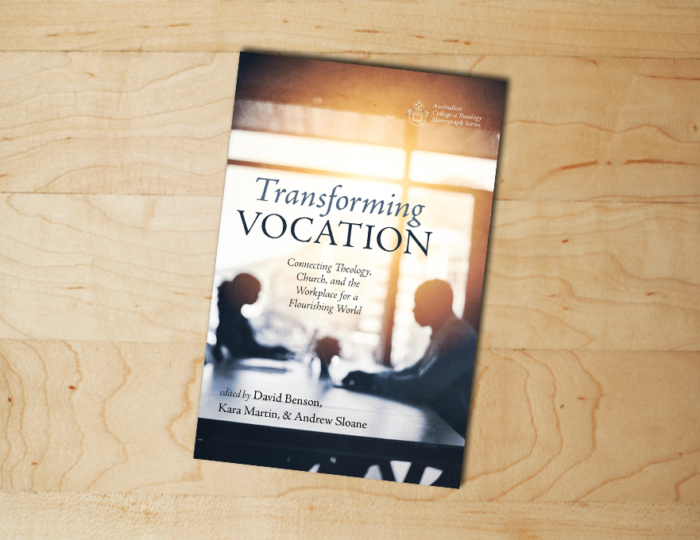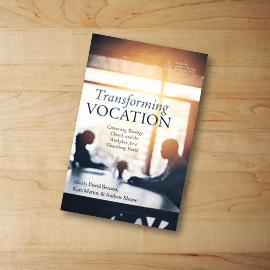Whole-life disciples: good news for theological colleges (and the nation)
Q1: ‘What kind of disciples does Jesus want to send out into the world?’ That was the question the pastor asked himself. Then he asked… Q2: ‘What ki...
Read

‘As Christians, we often talk about “salvation” – which we should. But it’s not just about going somewhere when you die. It’s about the healing of the person, their community, their world.’
So says Dave Benson, LICC’s Culture and Discipleship Director, when we sit down to chat about the new book he’s edited. Dave isn’t one to shy away from a big vision, and Transforming Vocation bears that out in spades. It’s about nothing less than the reformation of theological education, a field he’s worked in for much of his career.
But we’re getting ahead of ourselves. Back to salvation.
‘At its heart,’ says Dave, ‘salvation is about bringing each of us into right relationship with God and with the people and creation around us. We’re not saved to make converts by hook or by crook – we’re saved to be a taste of God’s kingdom now to those around us.
‘If that’s the church’s mission, how do we form people for it?’
That, as Shakespeare said, is the question. And this is where Transforming Vocation comes in. Written by a team of academics, it makes the case for putting faith–work integration at the heart of theological education. In other words, using the example of work, it demonstrates how theological colleges, churches, and Christians will all benefit if they work together to equip people for their frontlines.
Dave explains: ‘It’s essential to integrate faith and work – and indeed, the whole of our lives – because the glory of God demands no less. If discipleship really is a whole-life pursuit, if the gospel really means Christ reconciling all things to himself, then theological education can’t just be about recruiting people into the academy. It needs to be more holistic than that. It needs to be about forming leaders who mould churches that grow disciples who make a difference for Christ in their daily lives.’
This isn’t a new idea – in fact, the Transforming Vocation book is the culmination of several years’ work.
‘I’ve been passionate about encouraging a frontline-focused culture in theological education for years, and the Transforming Vocation project originally grew out of that passion back in 2017. My colleagues Andrew Sloane, Kara Martin, and I saw there was a low take-up of study relating to faith-work integration in our colleges, and decided to do something about it.
‘We conducted research to see what the situation was worldwide, and then held a gathering with representatives from 12 colleges across Australia and New Zealand. We discussed the state of faith–work integration in theological education, asking why we tend not to focus on it and what we can do to bring it to the foreground. That gathering led to a report on the state of faith–work integration, with recommendations for change.
‘The aim wasn’t just to bash people over the head with a report, though – we wanted to grow a community of practice, learning together how to improve. We met for a conference in 2019 to begin modelling that process of integration, and following on from that we built a website so all the colleges could share best practice, teaching modules, academic papers from the conference, and so on. Now, this book is the final piece of the project.’
For Dave, the ultimate goal isn’t just to get colleges to teach more courses on faith–work integration. It’s to improve dialogue between people right across the spectrum, from colleges to church leaders to individual Christians, so that the mission of the church thrives.
‘A lot of research on faith–work integration tends to focus on one particular setting – how Christians can take their faith into the workplace, how churches can equip people for their jobs, how colleges can engage with work as a theological concern. But we want to bring these groups into each other’s orbit to work out how can they work together. They all need to listen to each other and shape what they do based on the needs of the others.
‘For example, when theological educators listen more to the needs of working Christians, we change the way we teach and assess. And that can have a huge ripple effect. Take Brad, a pastor who studied faith–work integration with me. I encouraged him to get out and pray for people on their frontlines and commission them into their workplaces. In doing that, he realised there was a big gap between what the kingdom of God looks like in all its variety, and the way his church community looked, with its near-total focus on “in-house” activities.
‘So he went back and started a network to ask how the church could support people in their workplaces. He started doing vocational mentoring, telling people’s workplace stories in church, and explaining parables in a way that connected with his congregation’s workplaces.’
What started as a module in a theological college grew into a major culture-shift in Brad’s church – and that was echoed in other churches whose leaders studied the same module. Thousands of Christians began to see their jobs, the places where they spent most of their waking lives, through God’s eyes. That’s the vision Transforming Vocation holds out: colleges and churches working together to equip Christians to make a difference where God’s placed them, to the glory of his kingdom.
Dave’s careful to say that the book isn’t just for academics locked away in fusty libraries. It’s designed to be helpful for anyone who’s concerned about faith–work integration – workers, church leaders, and teachers alike.
As Dave puts it: ‘We want to give people the tools to really listen to what’s happening where they’re located – their work, their gym, their home – and work out how to follow Jesus there.’
At its heart, that’s why the message of Transforming Vocation is so crucial. Because theological education isn’t detached from frontline mission – it’s integral to it.
‘The health of our churches is intimately related to that of our theological colleges. With this book, our hope is not to reform a particular area of study. It’s to “wash the feet” of our theological educators: to ask how we can support them as they play their part in forming whole-life disciplemaking leaders – for the health of the church and the flourishing of workers, so that the reign of Christ would be seen in every area of life.’
